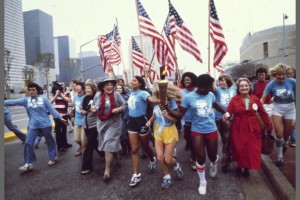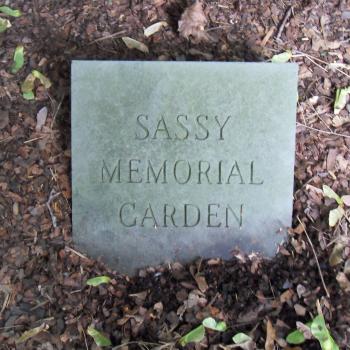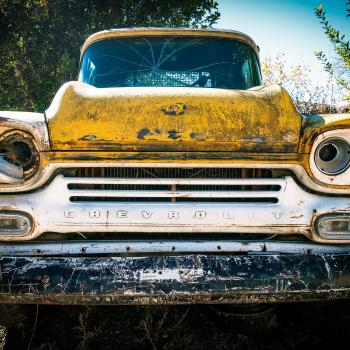 Imagine that you’re in grade school in the 1950s. At Thanksgiving, Uncle Richard turns to you and asks, “So, what do you want to be when you grow up?”
Imagine that you’re in grade school in the 1950s. At Thanksgiving, Uncle Richard turns to you and asks, “So, what do you want to be when you grow up?”
Ah, but this is a trick scenario. Uncle Richard will turn to you only if you’re a boy. And you’ll answer “a mailman” or “a doctor” or “a policeman.”
If you’re a girl, Uncle Richard won’t turn to you with this question. As far as his question goes, you’re invisible. Because he already knows, along with all of American society, what you’ll grow up to be. If you’re a white middle-class girl, you’ll become a wife and mother. If you’re a black girl living in poverty (as most black families were), you’ll become a housemaid…as well as wife and mother in your own home.
It’s this reality of women’s lives in the 1950s that the magnificent documentary, Makers: Women Who Make America, begins with. The three-hour film aired on PBS in February, but you can stream it in one-hour segments here.
I’m aware that “magnificent” sounds hyperbolic. But I came of age during the years covered by part one of the film. I lived each of its moments. And I can attest that they are true—true to the lives of the white middle class women who generated the women’s movement. In a post a while back, I detailed some of the specific gender discrimination I experienced in my teens and early twenties.
The documentary is true to the experience of women in the 1950s, when society insisted that our role in life was restricted to wife and mother. True to the experience of women in the early 1960s, who discovered in Betty Friedan’s explosive The Feminine Mystique that they were not alone in feeling stifled by a ban on their participation in the larger society.
True to the experience of those women in the late 1960s who formed a women’s liberation movement modeled on the civil rights movement that many had been part of.
We burned our bras and tossed those girdles (yes, girdles) in the trash. These of course were merely symbolic gestures of liberation. More substantively, the newly formed National Organization for Women fought legal cases for women’s rights in the workplace. And Ms. Magazine, founded in 1972, published the first exposé of domestic violence. Before that, there was no word for or concept of domestic violence. It was, as Gloria Steinem says in the film, “just life.”
I wrote my doctoral dissertation in 1969-1970. An experimental option offered by the Rutgers University English Department (yes, experimental—remember, this was the cusp of the 1960s) was a three-part dissertation: a scholarly paper, a close reading of a text, and a public lecture, each on writings from a different era. For the public lecture, I chose as my topic “The Rhetoric of Women’s Lib.”
My point, as I recall it, was that previously women had addressed themselves to men. That is, in what they said or wrote, their imagined audience was male. But the women’s movement was creating a radically new opening for women to speak to each other.
Of course, women had always spoken to each other. They’d exchanged recipes and tips on toilet training their kids. But they hadn’t spoken to each other from their souls. Not until the women’s movement.
In fact, women weren’t women until women’s lib. They were girls or ladies—until they kept insisting that they be called women, which eventually they were.
It wasn’t only women who were being liberated by this movement that was breaking the mold of women’s traditional roles. In 1970 my husband married me because he desperately wanted to be liberated from the male roles that he found oppressive (always having to be strong, to be the decision maker, to be deferred to). Soon after we were married, he started baking bread. He said massaging the yeasty dough was the closest he could come to feeling pregnant.
Increasingly, men (not all, but many) found relief in being freed from traditional male roles and behaviors. (Don’t cry. Don’t express your feelings. Stay strong for the family.) You dads who enjoy taking part in your kids’ upbringing: you owe this fulfillment to the women’s movement of forty-plus years ago, which welcomed men to share in child-rearing.
During my first teaching job in the early 1970s, at a small liberal arts college for women, I joined other young women profs around the country in crafting new courses on Women Writers and Women in Literature. Why, we asked, did female protagonists always end up either married or dead?
The 1970s were heady times for women entering academia. In my own field, Feminist Literary Criticism was born. Soon there was also Feminist Theology, Women in Film, and Women’s History (find those diaries and letters of pioneer women, for instance, and learn what westward expansion felt like for them).
But part of me has always been impatient with isms. So by the mid-1970s I was writing articles (snooty, I’m afraid) critiquing what had become clichés of Feminist Criticism: generalizations that women are oppressed, that the power structure excludes women’s voices, and so on. What about the uniqueness of each individual, I asked?
Makers: Women Who Make America ends with the voices of young women today who treasure their uniqueness, and who happily take for granted that any career is open to them, including the option of staying home to raise their kids. They know they’re reaping the benefits of their mothers’ battles. And they know that all the battles aren’t won.
But Uncle Richard turns to their daughters at Thanksgiving and asks, “So, what do you want to be when you grow up?” And the girls answer: “a police officer” or “a TV news reporter” or “President.” And nobody blinks.
Peggy Rosenthal is director of Poetry Retreats and writes widely on poetry as a spiritual resource. Her books include Praying through Poetry: Hope for Violent Times(Franciscan Media), and The Poets’ Jesus (Oxford). SeeAmazon for full list. She also teaches an online course, “Poetry as a Spiritual Practice,” through Image’s Glen Online program.











